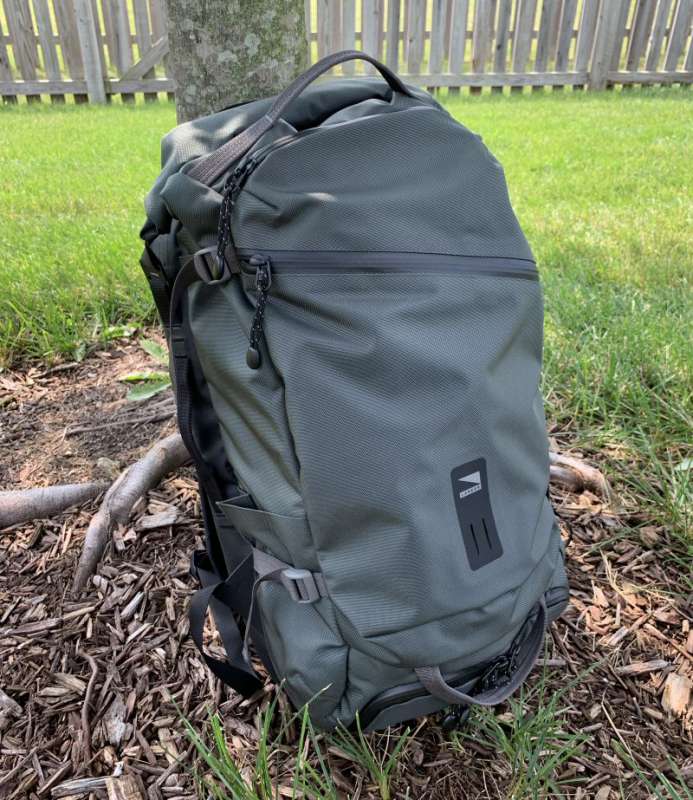
REVIEW – I’ll be honest up front here. I’d been eyeing Lander’s packs since I missed being a backer on their successfully funded Kickstarter campaign back in 2018. Their packs just had a great look and appeared to be loaded with solid functionality. I couldn’t accept Julie’s offer to review a Lander pack fast enough. Does the Lander Traveler Backpack 35L live up to the hype I’d built up for it? Let’s check it out. Gadget on!
What is it?
The Lander Traveler Backpack 35L is a tech backpack designed for travel of 3-4 days or a long weekend. It features a roll-top design with side-zip access as well as several additional compartments and pockets to organize and protect your gear, including a specially designed one that lets your charge your devices while inside the pack.
What’s in the box?
- Lander Traveler Backpack 35L
Hardware specs
- 35L capacity
- Materials:
- Cargo section = canvas-like, DWR coated Cordura Ecomade
- Crash Pad laptop compartment = TPU coated ripstop material
- Taped waterproof seams
- Waterproof zippers
- Cargo section made from water-resistant, canvas-like, ripstop DWR-coated, recycled Cordura EcoMade material
- Dimensions: 23.62 x 12.99 x 7.87 in (0.6 x 0.33 x 0.2 m)
- Weight: 48oz/3lb (1.36kg)
- Airline carry-on approved
- Warranty: 1 year limited warranty
Design and features
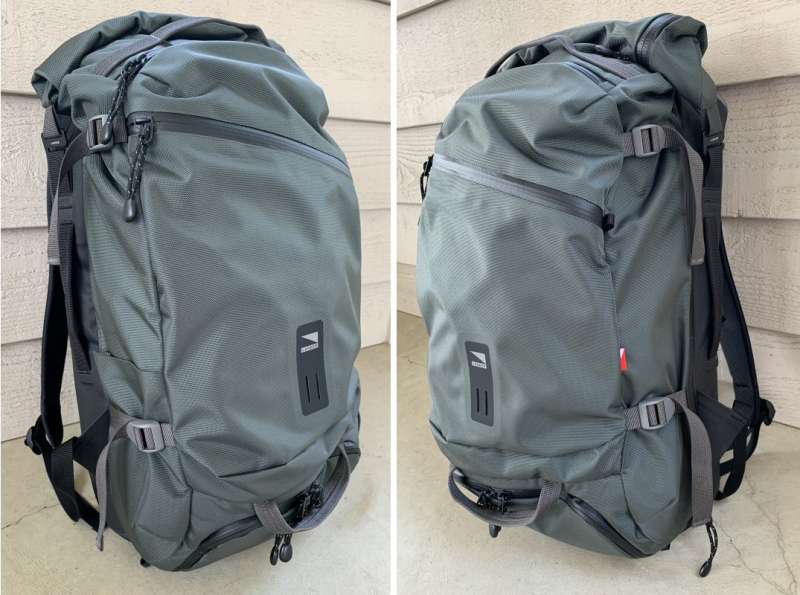
Based solely on “right-out-of-the-box” first impression, I was indeed very impressed with the Traveler. It has the look and feel of a pack that is very carefully designed and solidly constructed from high-quality materials.
I also really like the Traveler’s colorway. The main color of the pack, which comprises the cargo section of the pack is a combination of its grey/green color for the main cargo section with black and gray accents for things like the Crash Pad, and shoulder and compression straps, and this color combo all work well for this pack. To me, this unique, subdued grey/green color and the also subdued black and grey accents give it a look that simultaneously says “outdoors” and “hiking,” but also says “travel” or “urban commute” and even has a touch of “tactical.” While the vast majority of pack companies tend to go the simple route and make most of their packs black to appeal to the masses, I’m delighted Lander went with this colorway for the Traveler.
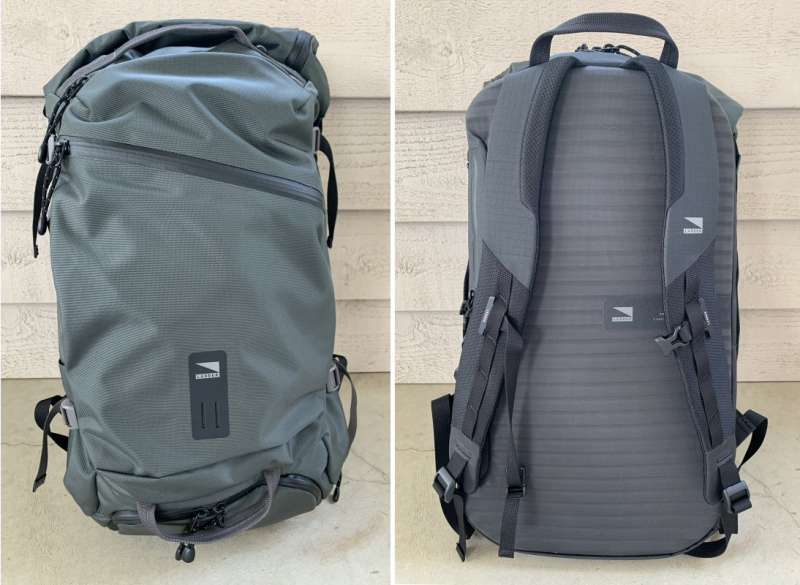
The Traveler has two main sections, each constructed from different fabrics. As seen in the image above left, the Cargo Section is its large, main compartment, and is made from a grey-green DWR-coated, recycled material called Cordura EcoMade. This fabric has a smooth but tough feel. As seen in the image above right, the Crash Pad is the Traveler’s laptop compartment located behind the main Cargo Section and is made from black TPU coated ripstop material that is waterproof, impact protective, and breathable.
To me, the Traveler’s subdued combination of grey/green cargo section, black Crash Pad, and dark gray handles and straps, is a perfect colorway for this pack. It gives a look that simultaneously says “outdoors” and “hiking,” but also says “travel” or “urban commute” and even has a touch of “tactical.” While the vast majority of pack companies tend to go the simple route and make most of their packs black to appeal to the masses, I’m delighted Lander went with this colorway for the Traveler.
Shoulder straps
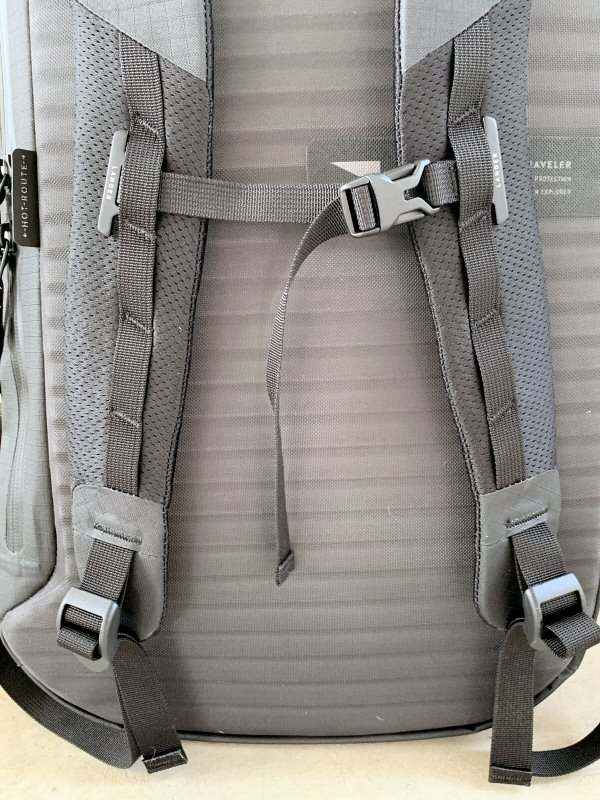
Let’s walk through the features, of which the Traveler has many, but not too many, as I think you’ll see. I’d argue that the two most important parts of a backpack are its shoulder straps and its cargo compartment. We’ll cover the latter in detail later, but for now, we’ll look at the Traveler’s shoulder straps. The straps themselves have several features, one of which is the strip of webbing tacked down at several points to provide attachment points for carabiners, pouches, or other accessories.
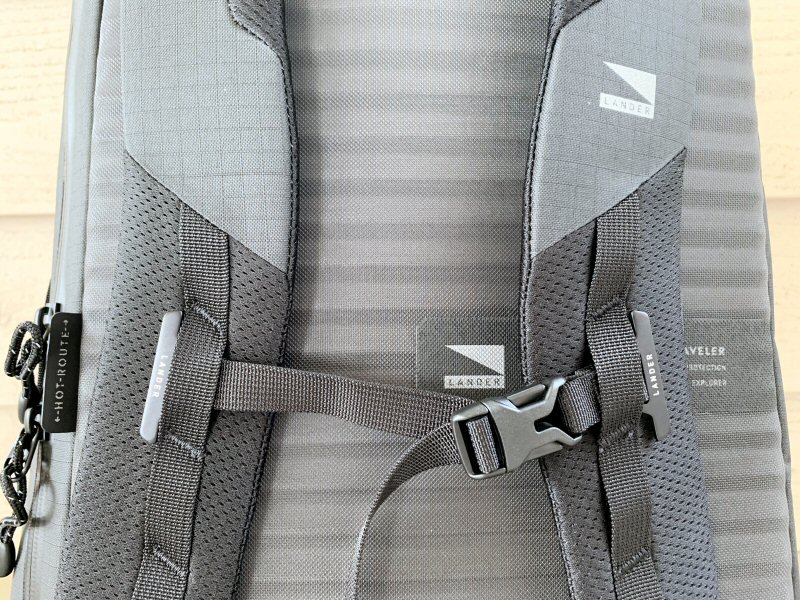
In travel, dealing with the unexpected can be either a hassle or an adventure, depending on your mindset. A sternum strap gives additional stability for situations like hiking up a trail, sprinting to get out of the rain, or hoofing it to catch a flight. The Traveler’s sternum strap has a side-release, quick-connect buckle and is adjustable in two ways: first, its width across the chest can be easily adjusted one-handed by pulling on its free end, and it can be loosened just as easily.
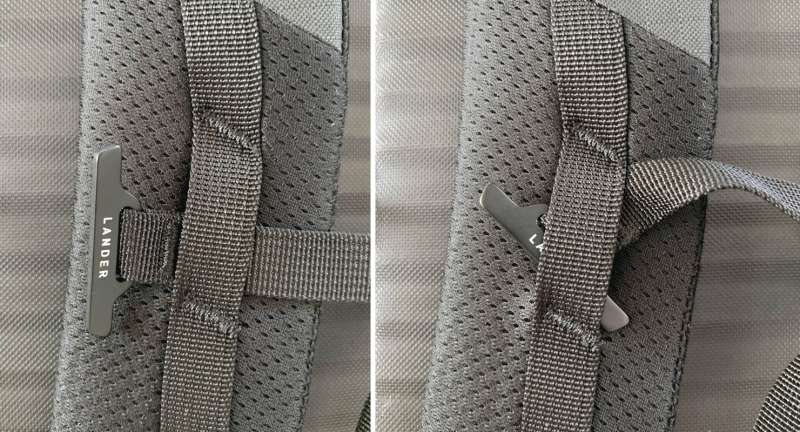
The other way in which the Traveler’s sternum strap can be adjusted is its vertical height position. There is a “T”-shaped metal anchor with the Lander logo attached to the end of both parts of the sternum strap’s webbing. These anchors can be quickly slid out from the shoulder straps’ vertical webbing segments and move up or down to find the best fit for you.
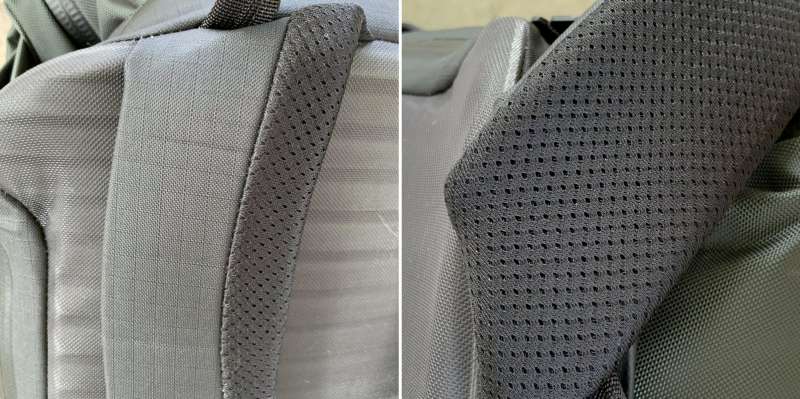
The shoulder straps themselves are constructed from three fabrics, two of which are shown in the two images above. The left image shows the main outside-facing fabric, which is the same water-resistant, canvas-like, ripstop, DWR-coated, recycled Cordura EcoMade material from which almost the entire rest of the pack’s exterior is constructed. In the image above on the right, you can see the porous, foam-core padding on the interior of the shoulder straps. This thick foam padding helps the pack feel comfortable on your shoulders even when fully loaded and the porous, breathable mesh helps reduce sweat and keep the area ventilated.
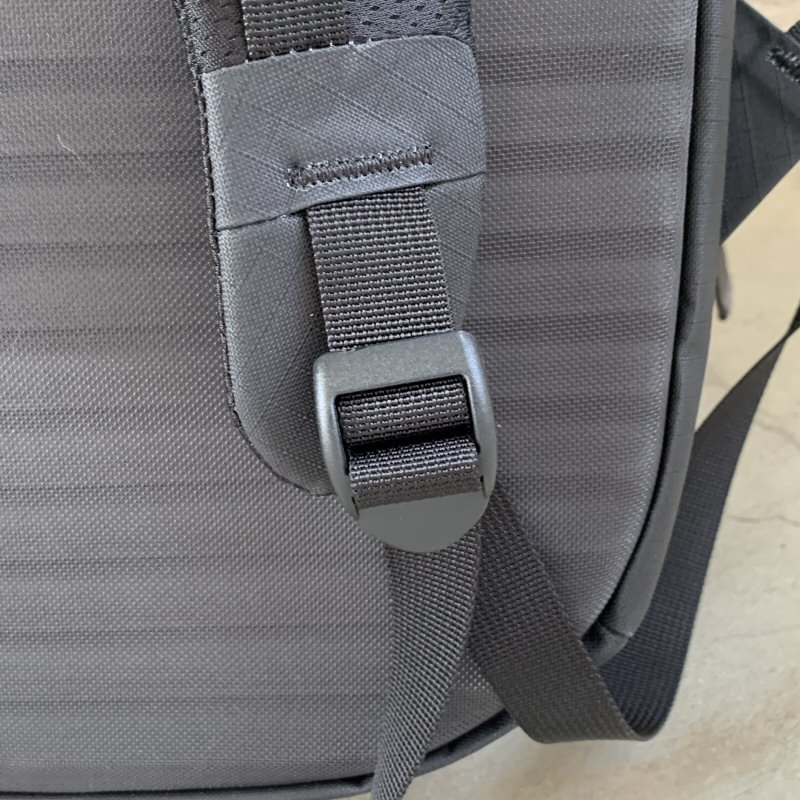
Near the bottom of the shoulder strap where its length adjustment buckles are located, the webbing is sewin with a heavy-duty stitch into another piece of the TPU coated ripstop material for added durability. This over-stitching and anchoring into a durable material is a common theme throughout the Traveler’s design and construction.
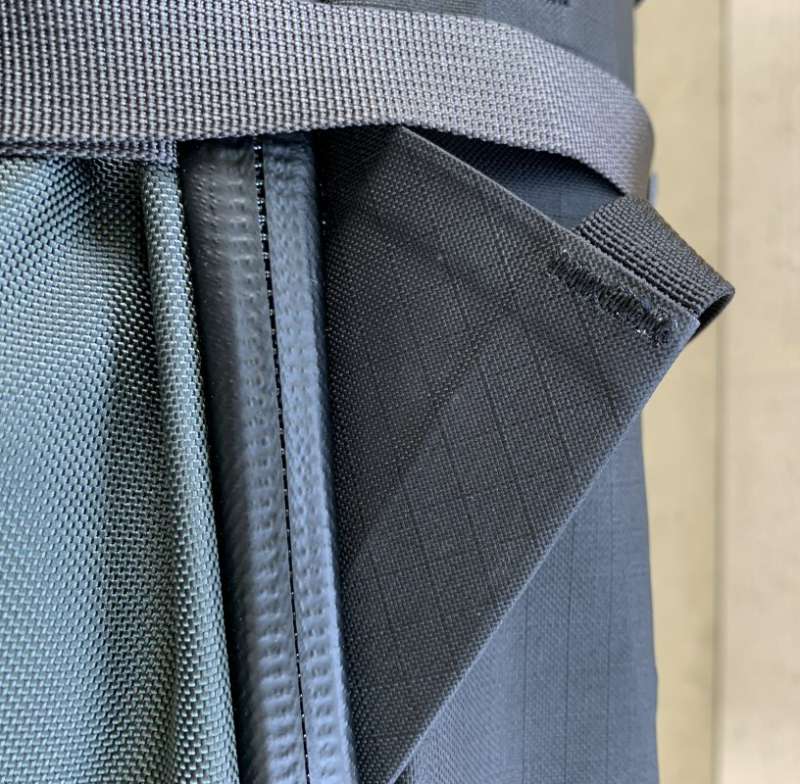
The final feature of the Traveler’s shoulder straps is how they attach to the main body of the pack, which can be seen in the above photo. A piece of TPU coated ripstop material, the same material from which the Crash Pad laptop compartment is made (more on this later), is sewn directly into the main seam along the back of the pack, and the bottom webbing of the shoulder strap is heavily stitched into this. As mentioned above, this type of design and construction helps reinforce potential weak points like this one.
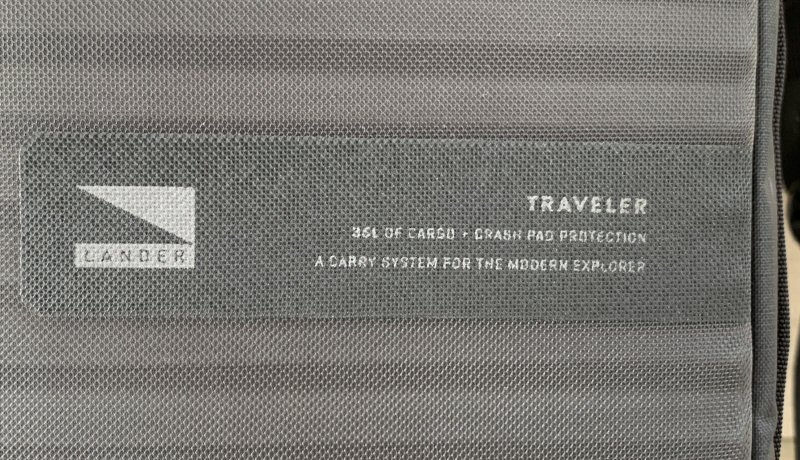
To me, a telltale sign that a company wants to let the design and quality of their product speak for itself is the use of small and/or subdued logos on their product. Lander has thankfully gone this route with the Traveler, as you can see from the photos in this review. In fact, one of the few spots where Lander has placed their company logo is on a strip of heat-pressed fabric (see photo above) that is actually located on the back of the Traveler, which cannot even be seen when wearing the pack. Now that’s subtlety.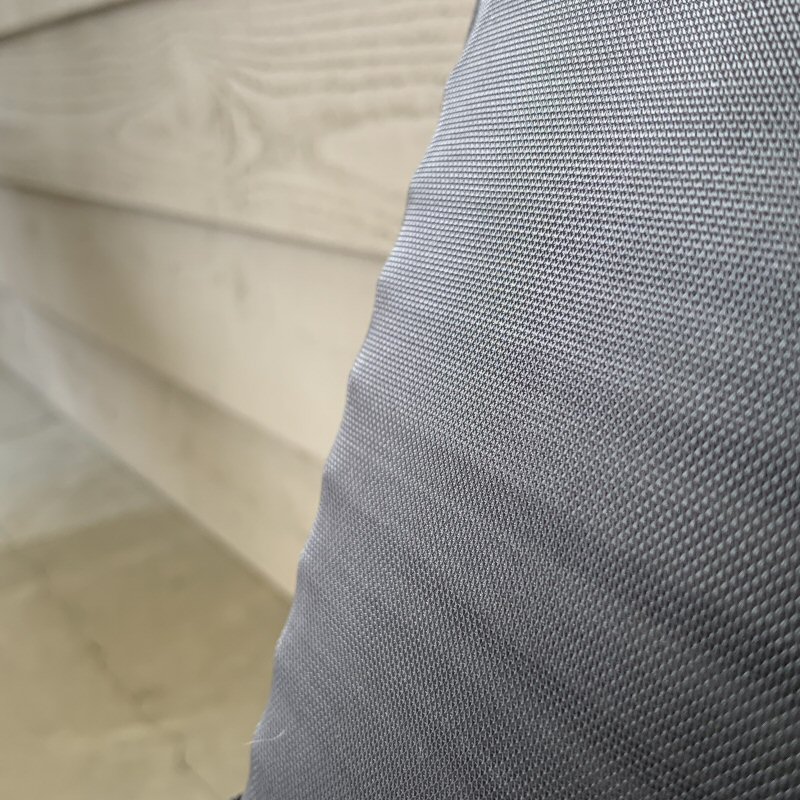
The back of the Traveler features a sheet of semi-rigid foam for its back panel that both provides some rigidity to the pack to help retain its shape and also serves as part of the Crash Pad that protects a laptop or other device placed inside it. This back panel has a ribbed design, as seen in the image above, which helps ventilate moisture from your back while wearing it.
All of the exterior zippers on the Travelers are coated to prevent moisture from entering through the zipper’s teeth, which greatly increases the pack’s water resistance. While I’d strongly advise against full submersion, the Traveler’s zippers should be able to weather anything up to a sustained downpour. In the image above, you can also see the Crash Pad’s black TPU coated ripstop material.
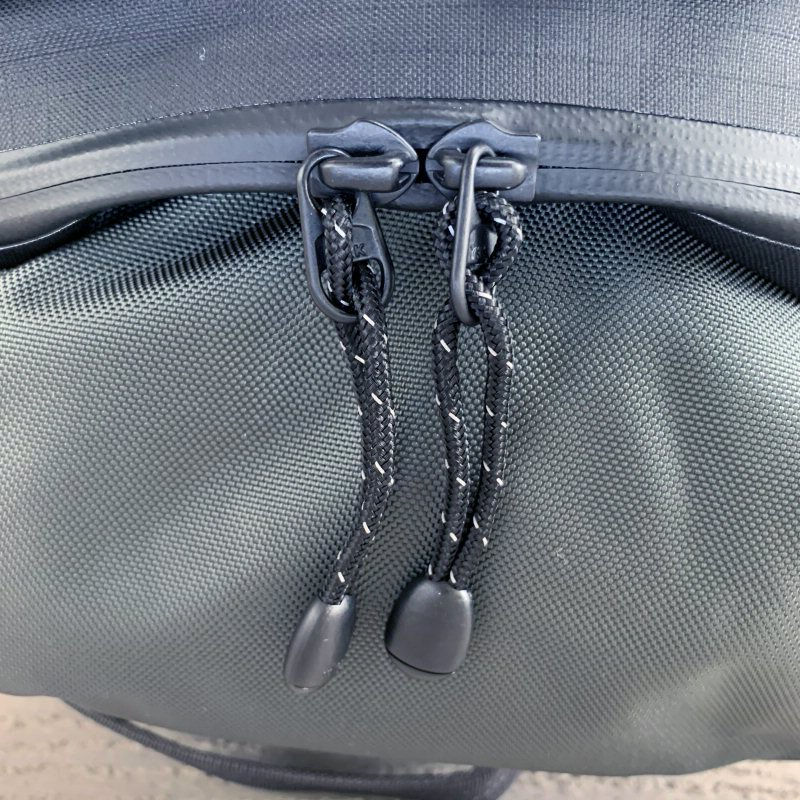
In addition to the water-resistant zippers, each zipper pull has a length of black paracord-like cord with a plastic tip. These help with grabbing and pulling the zipper pulls and they also have a reflective thread woven into them to aid in locating the zipper pulls in low light conditions, which Lander calls Illumifind.
Haul handles
Next, let’s look at the Traveler’s handles, of which there are a whopping five. All of these handles can serve as external attachment points for carabiners or other items you may want to attach to the outside of the pack.

If you’ve ever carried a pack or bag for travel, you know you might need to stow it in an overhead bin or beneath a seat, toss it into a taxi cab trunk, or suitcase-style carry it when using the shoulder straps isn’t convenient. Because of all this, you know that it’s handy to have more than one handle on the exterior of the pack so you can grab and carry it from various orientations.
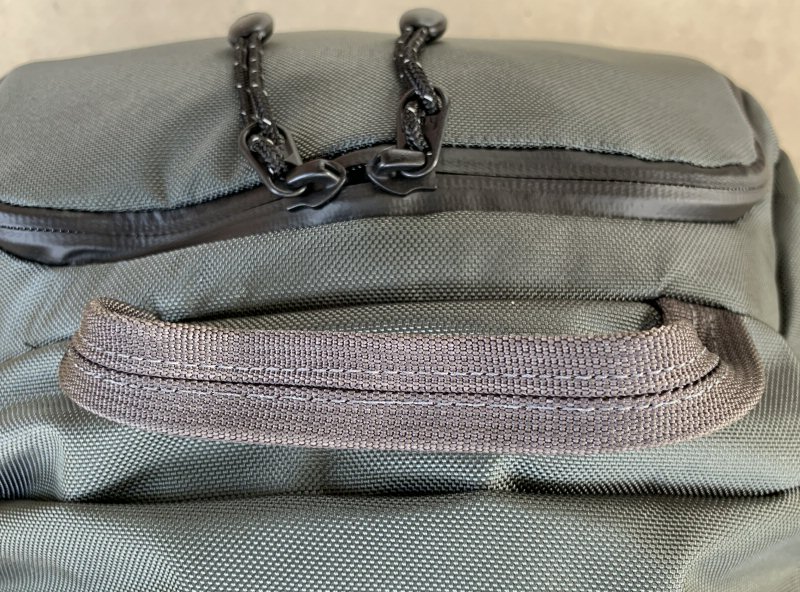 All of the Traveler’s handles are constructed from thick webbing that has been rolled longways to form a sort of tub, then stitched flat. The photo above shows the underside of the handles and illustrates this construction.
All of the Traveler’s handles are constructed from thick webbing that has been rolled longways to form a sort of tub, then stitched flat. The photo above shows the underside of the handles and illustrates this construction.
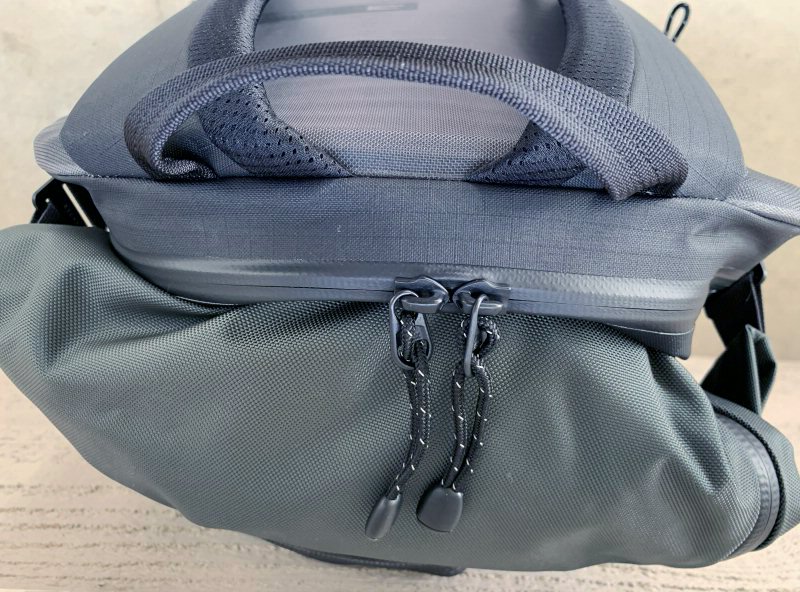
The very top of the Traveler has a black handle that is sewn directly into the seam between the top of the ribbed back panel and the Crash Pad, as seen in the image above.
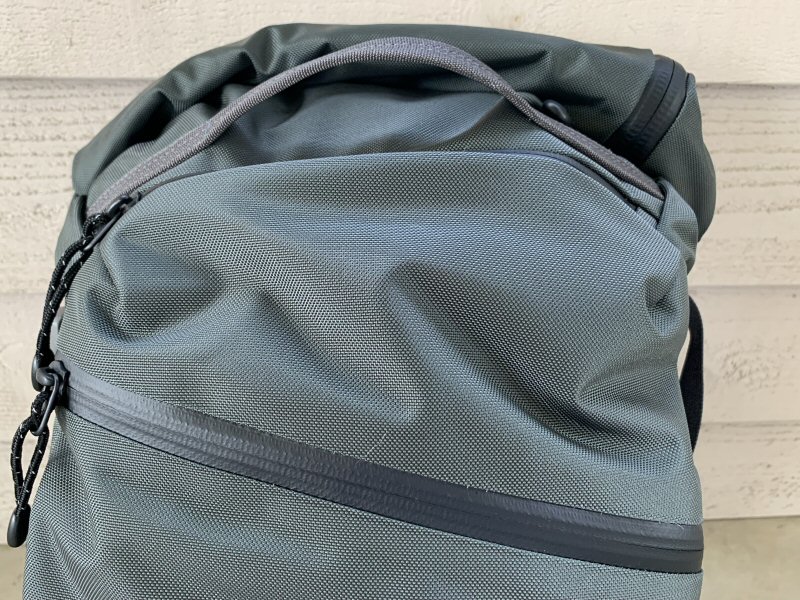
Another handle, this one made from dark grey webbing, sits toward the top front of the Traveler’s rolltop, as seen in the image above.
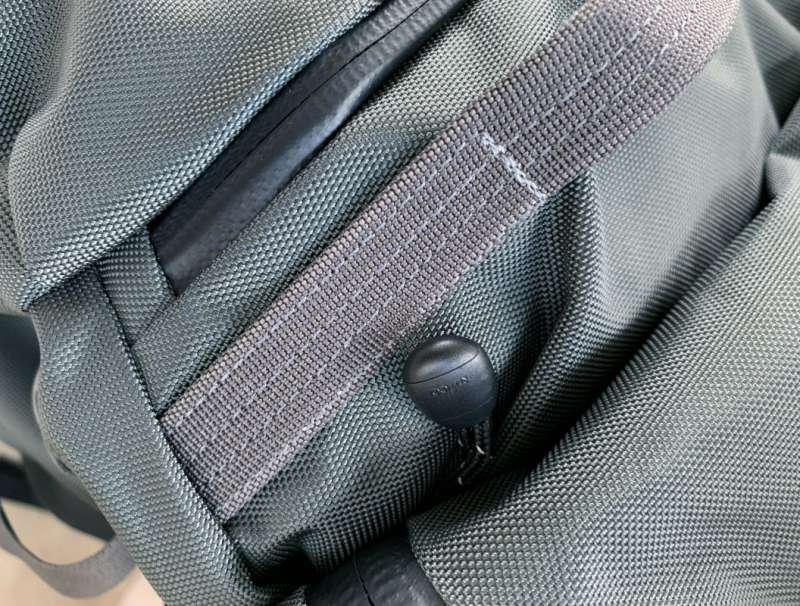
The ends of this handle are heavily stitched into the exterior of the pack to help prevent it from ripping loose while heavily loaded over time.
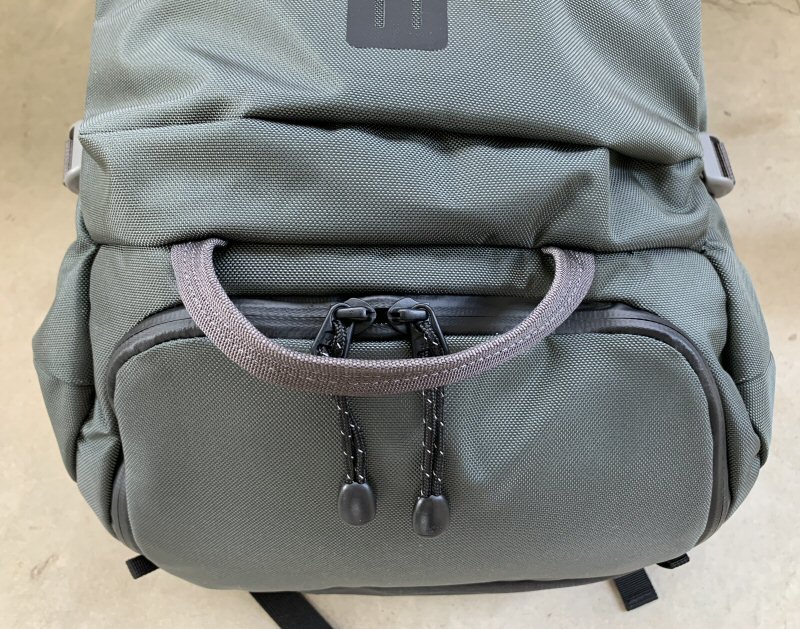
There is also a gray handle near the bottom of the Traveler. This one can work in tandem with the grey one near the top (described above) as good spots to grab the pack with each hand to aid in loading or unloading it from, say, the trunk of a car.
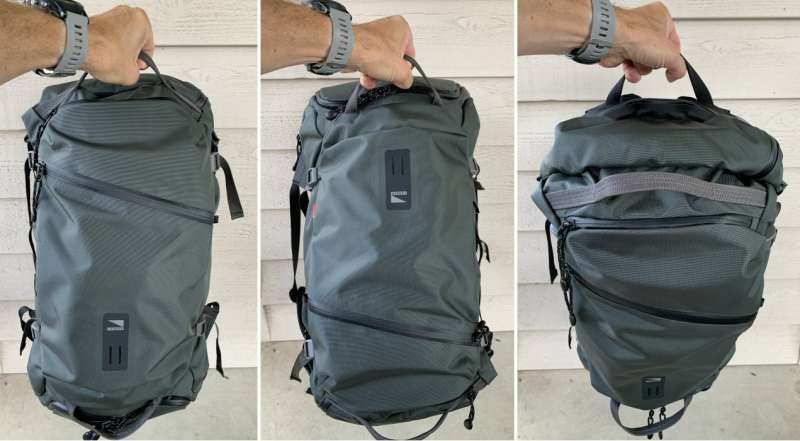
Each of these three handles is shown in the three images above. From left to right are the grey handle near the top, the grey handle near the bottom, and the black handle at the very top.
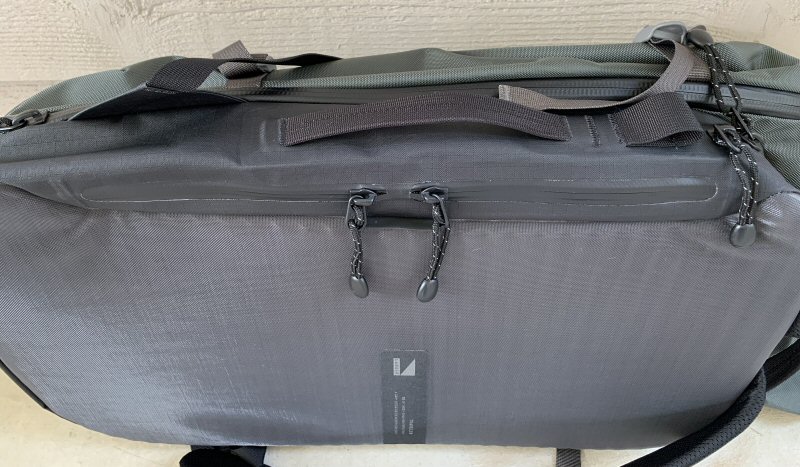 In addition to the very top black handle and the grey handles on the top/front and bottom/front, there is a black webbing handle on each side.
In addition to the very top black handle and the grey handles on the top/front and bottom/front, there is a black webbing handle on each side.
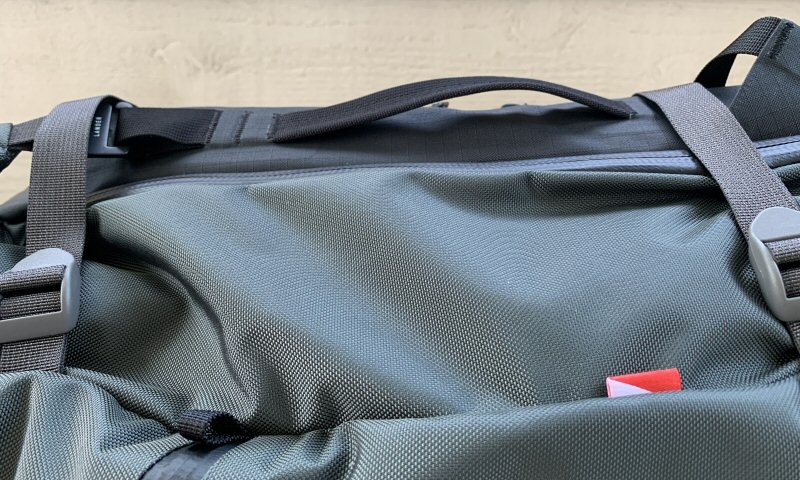
These handles almost blend into the sides of the Crash Pad.
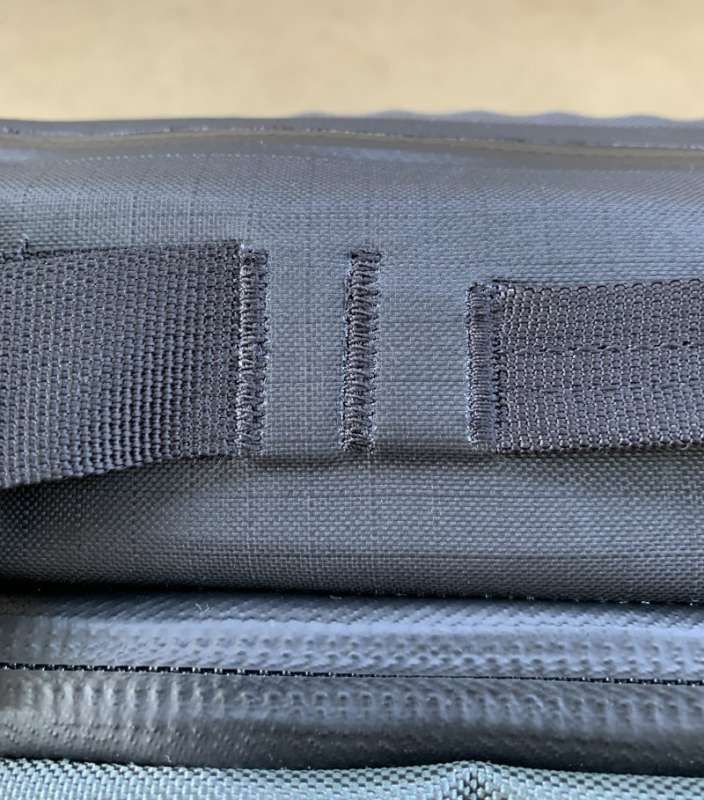
The side handles are very thoroughly stitched into the sides of the Traveler, as seen in the image above, again reinforcing a potential weak point of the pack.
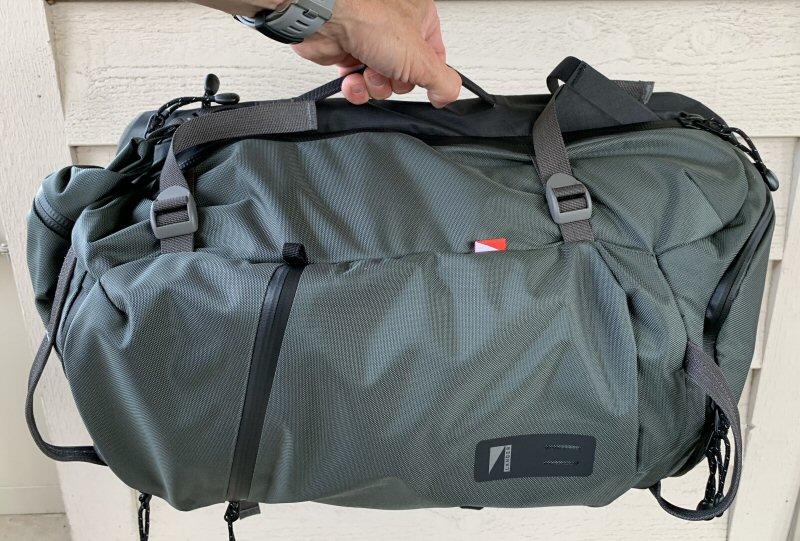
Either of these side handles can be used to pick up and carry the Traveler like a suitcase if needed or desired as seen in the images above and below.
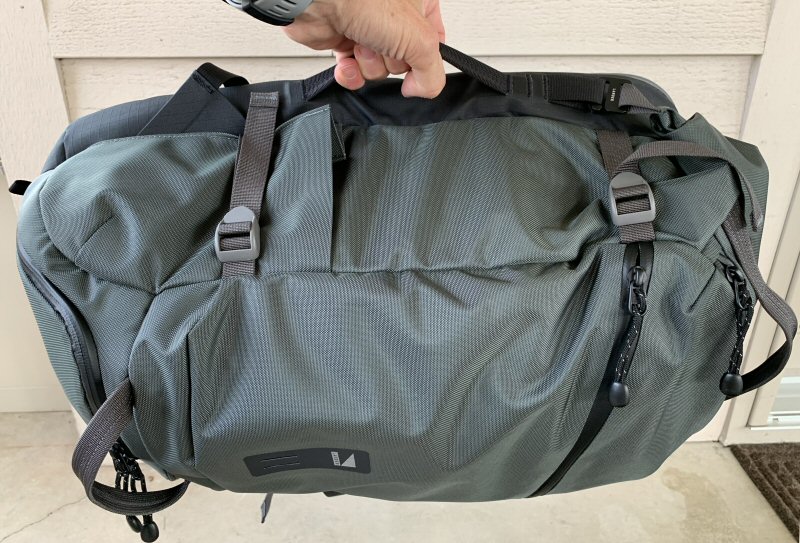
Compression Straps
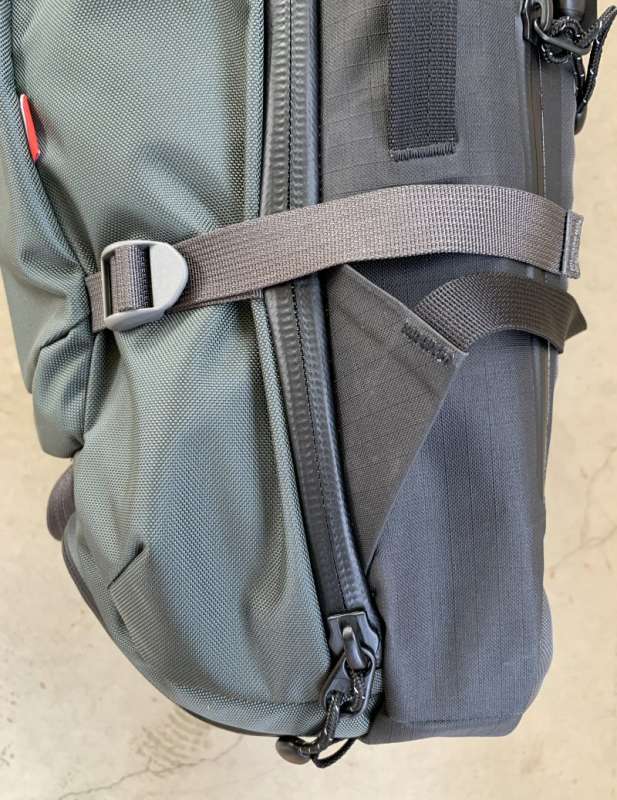
The Traveler has four compression straps, two on each side, that help reduce its cargo section’s overall thickness which helps keep it tight to your body and not flopping around when worn if the pack is not fully loaded. They can also be used to hold items, such as a yoga mat, sleeping mat, tripod, and so forth.
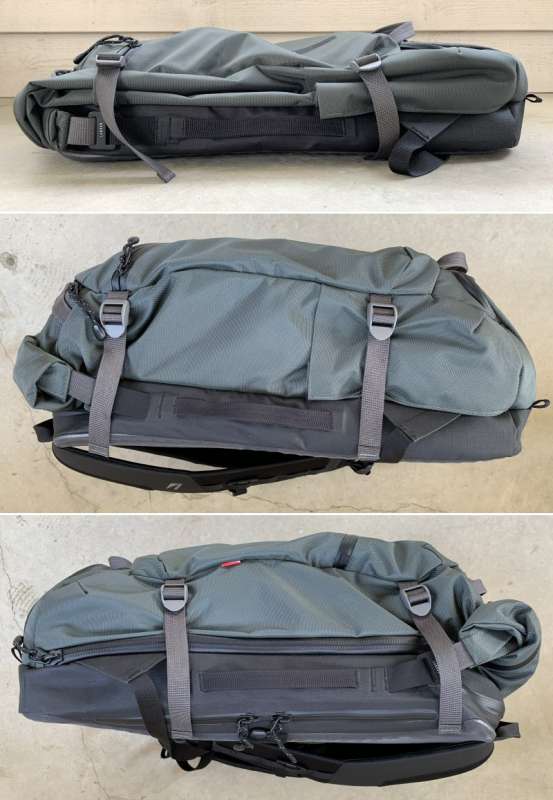
Above, the Traveler is shown completely empty with the compression straps fully tightened, then nearly fully loaded with gear with compression straps nearly fully loosened. The compression straps can be cinched down or loosened quickly, which makes them a handy feature for adjusting the on the fly if you take on more or less cargo.
Bottle pocket
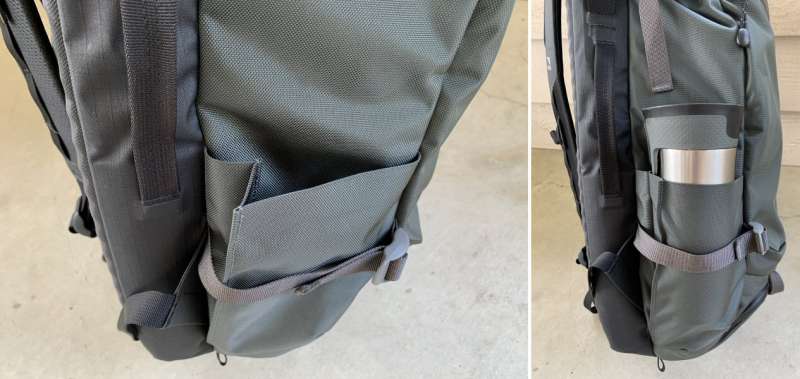
The Traveler has a single bottle pocket located on its left side as you are wearing it. This pocket is open at the top and has a fold along its side and the corner of the pocket is stitched in such a way that allows it to expand to accommodate smaller or larger container sizes. This pocket is also located under one of the compression straps, so cinching it down helps keep your bottle secured.
Exterior pockets
The Traveler has two exterior pockets that have each been thoughtfully designed with respect to not only their location and capacity but also how they fit into the overall shape and aesthetic of the pack. Each of these pockets has water-resistant zippers with corded zipper pull extensions.
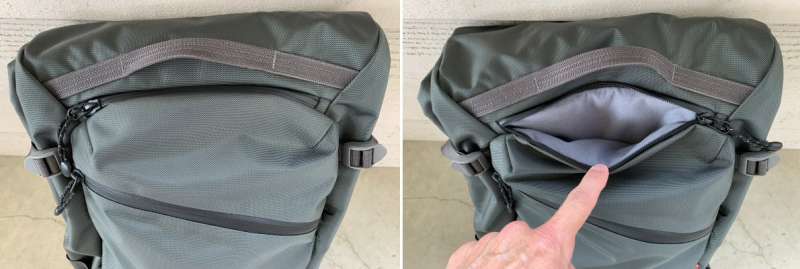
Starting at the top front, the Traveler has a pocket that is about 6 inches deep and 10 inches wide. It is lined with the same light grey soft microfiber fleece fabric that as the Crash Pad pocket described above, so this pocket is perfect to hold a phone or even a mini-tablet. Because of its location and capacity, I found this to be a great quick-access pocket for items like my wallet, phone, shades, earbuds breath mints, a power cable and small charger, protein bar, and other items that you might otherwise keep in your pocket.
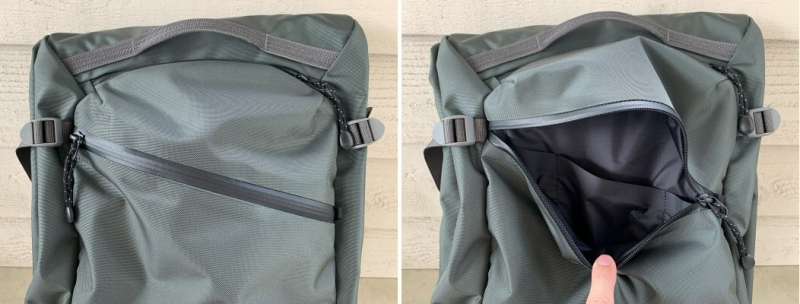
The next pocket down on the front of the Traveler is one with a slanted opening. This pocket is lined with a thin, black ripstop fabric.
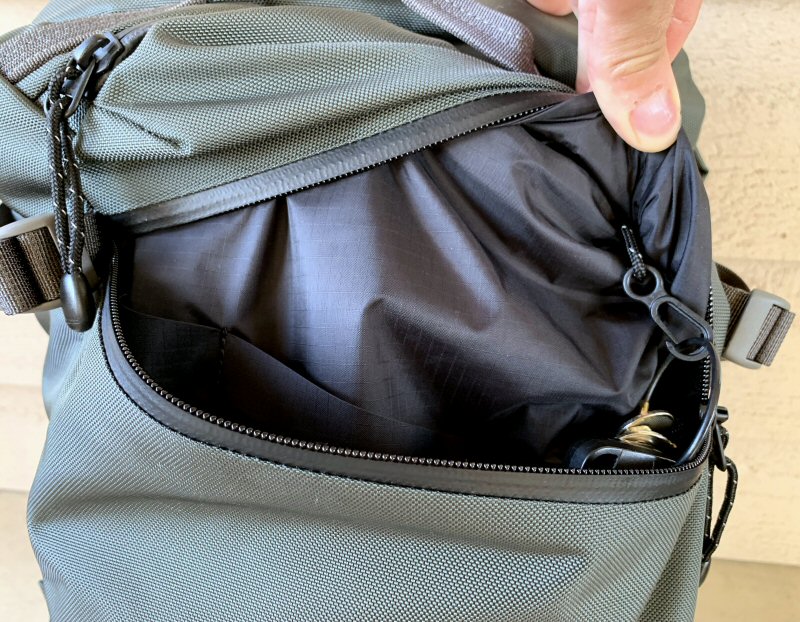
This pocket has some simple but useful organizational features inside, including three roughly 5-inch deep pockets to hold small items, as well as a key leash, tucked up under the far right corner of this pockets top flap. The far-left pocket will fit a few pens, while the other pockets are a bit short and could hold a travel mouse, some cables, earbuds, or other small items. The key leash is stitched into the inside seam of this pocket with a length of the same paracord-like cord used in the zipper pulls. However, this length or cord is so short that it is very difficult to hook a keyring to it; it takes quick a bit of manipulating of the pocket flap to accomplish this. I think this cord length could have been made a bit longer.
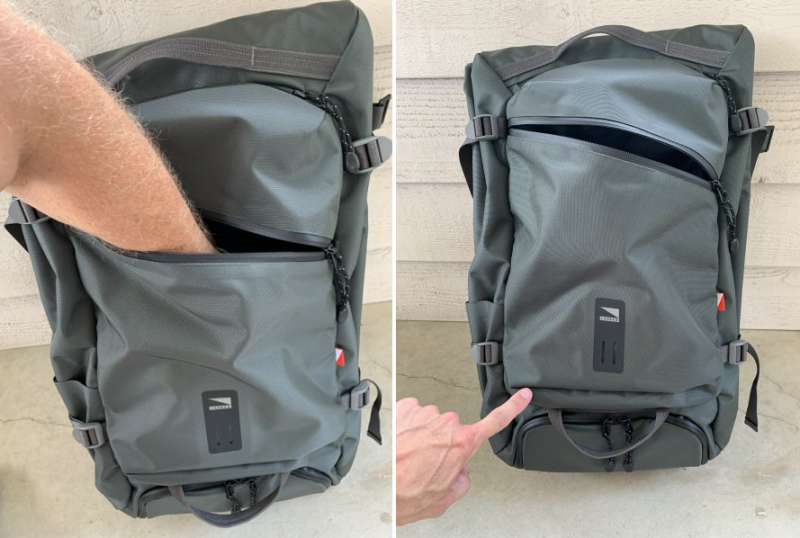
This pocket is about 10 inches wide but extends about 11 inches down, nearly the full length of the front of the Traveler, which I’ve attempted to illustrate above. This pocket can be used to hold larger items, like a cable and accessory pouch, headphones, a book, a thin rain shell and light hat, or even a full-sized tablet (although I’d be careful with placing a tablet in this pocket because it offers almost zero bump protection and is located on the outside of the pack.
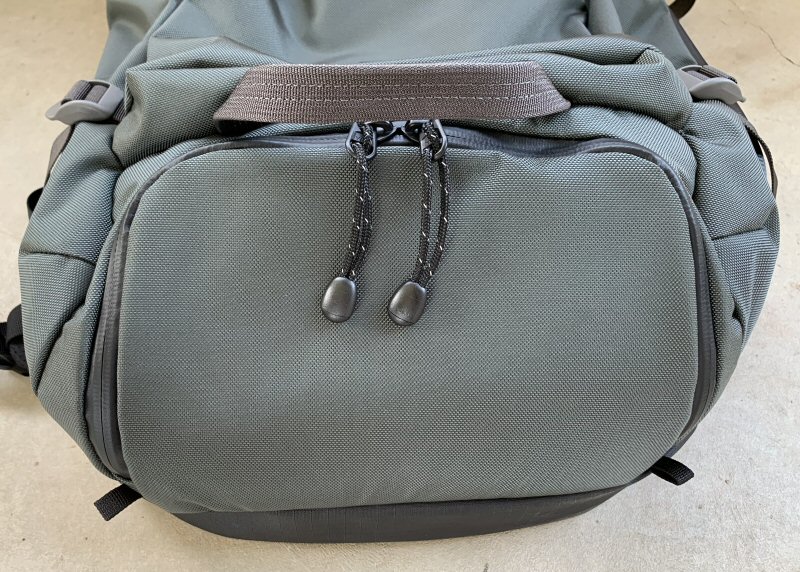
The final exterior pocket is located at the bottom of the Traveler. I’m calling this the “shoe compartment.”
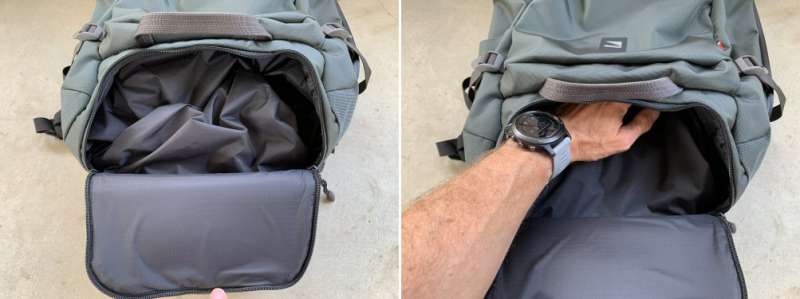
This pocket has a rectangular double-zipper opening that zips around three sides to allow ample access to its cavernous interior. Inside, it is lined with the same smooth black ripstop fabric as the long, flat exterior pocket described above, but this pocket has extra fabric that allows it to hold even larger items than even its generously large opening might indicate. In fact, this pocket can hold an extra few layers of clothing, a pair of shoes, or a weekend’s worth of dirty laundry. However, there is a catch: The more space you utilize in this pocket, the more space is cannibalized from the main compartment. More on this later.
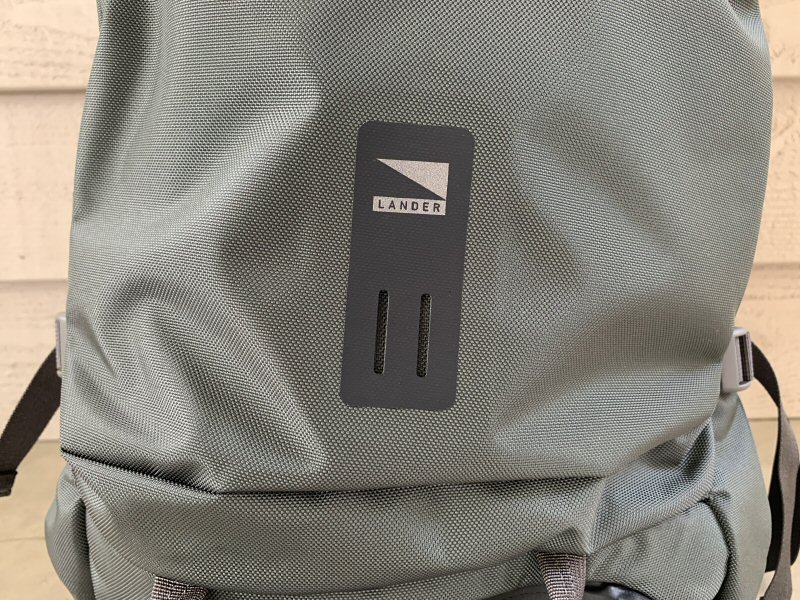
This last feature isn’t a pocket, but it is external, so I’m including it here. On the front of the Traveler is the Lander patch, a strip of head-pressed fabric with a reflective Lander logo (part of Illumifind) and two slots cut into the fabric. This is a load-bearing point and these slots can be used to attach a carabiner or other accessory, or you could even pass a length of elastic shock-cord through the slots, attach them to the two small loops on the bottom of the Traveler, and tether a sleeping bag, yoga mat, tripod, or other items to the bottom of the Traveler.
Hot Route
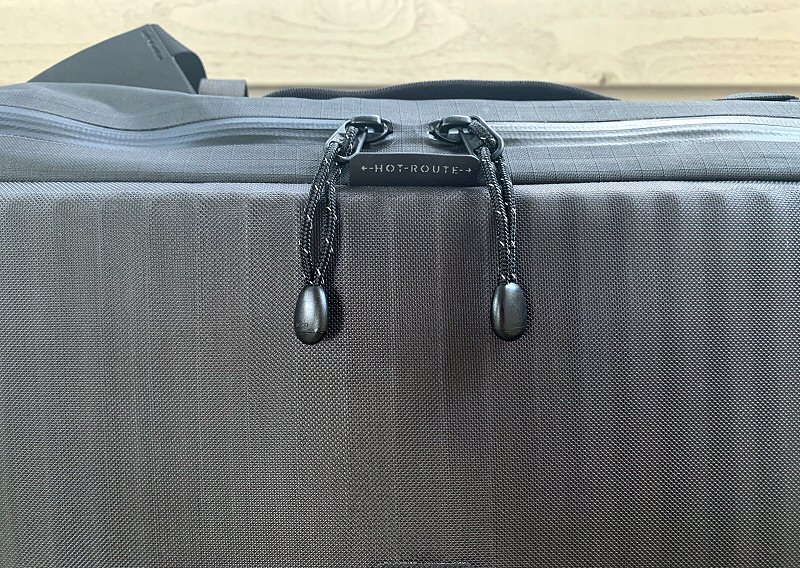 One of the unique features of the Traveler is its Hot Route system.
One of the unique features of the Traveler is its Hot Route system.
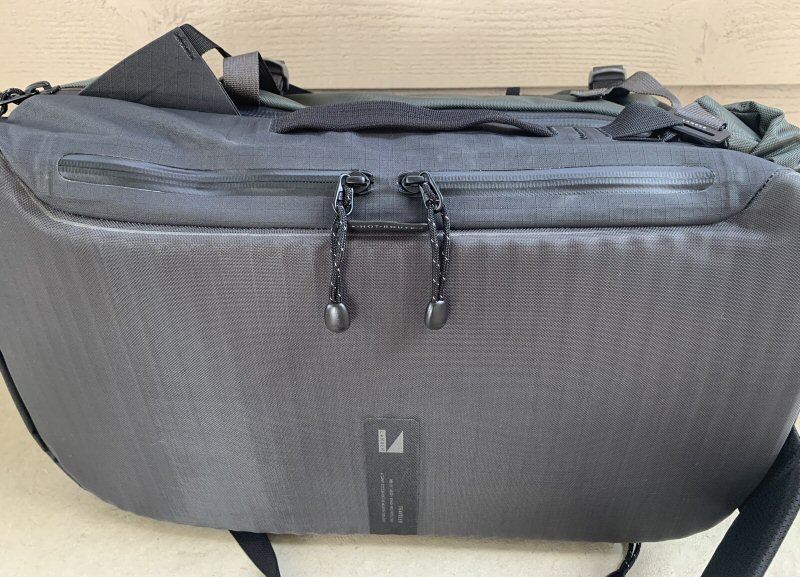
On the back of the Traveler are two side-accessible zipper pockets
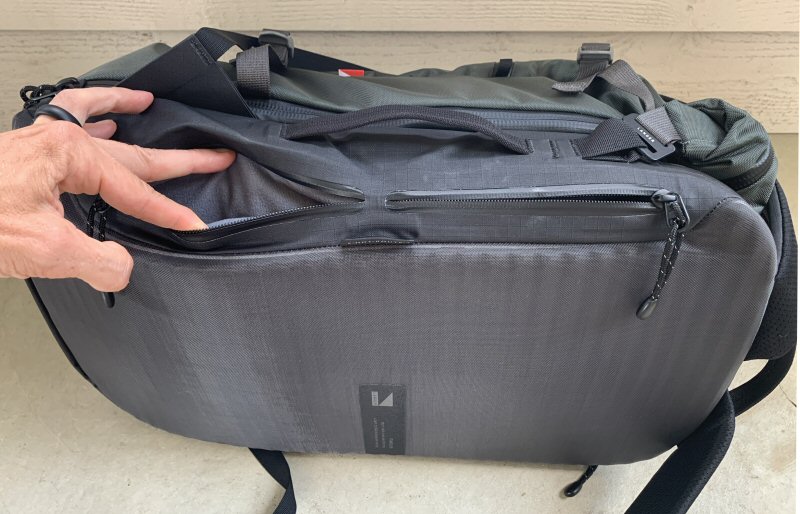
Each of these pockets is lined with the same light grey microfiber fleece fabric as some of the other exterior pockets, and is intended to help protect sensitive electronic devices from scratches. These two pockets are separated by a divider inside.
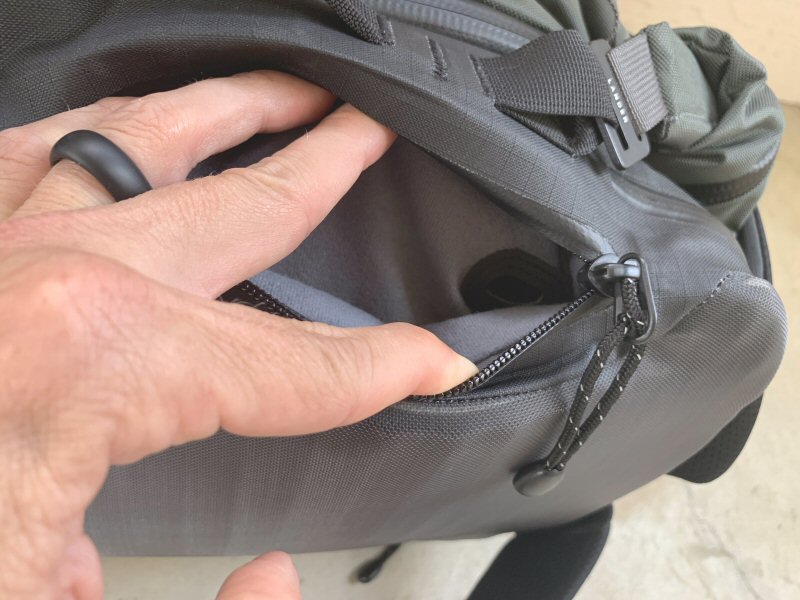
In the top far-right corner of the right pocket is a small passthrough portal that is part of the Traveler’s “Hot Route” system, a series of protected internal wireways. This portal allows you to pass a cable into the Crash Pad laptop sleeve compartment. There is also a small opening in the top of the divider between the two pockets through which you can pass cables between the two divided pockets. More on the Hot Route system below.
Crash Pad laptop sleeve
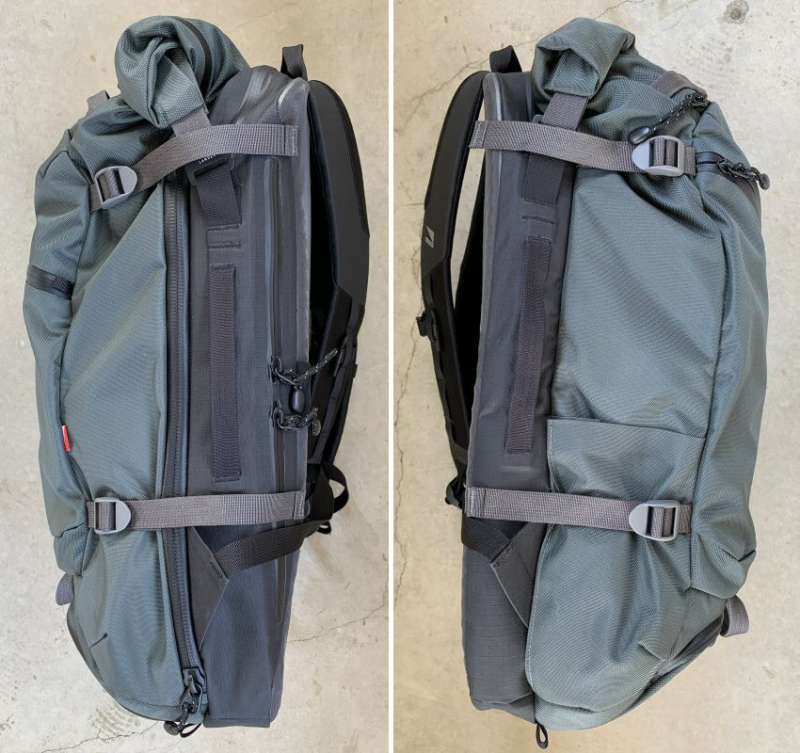
The Crash Pad is the Traveler’s black laptop sleeve that sits along the wearer’s back, behind the main cargo space.
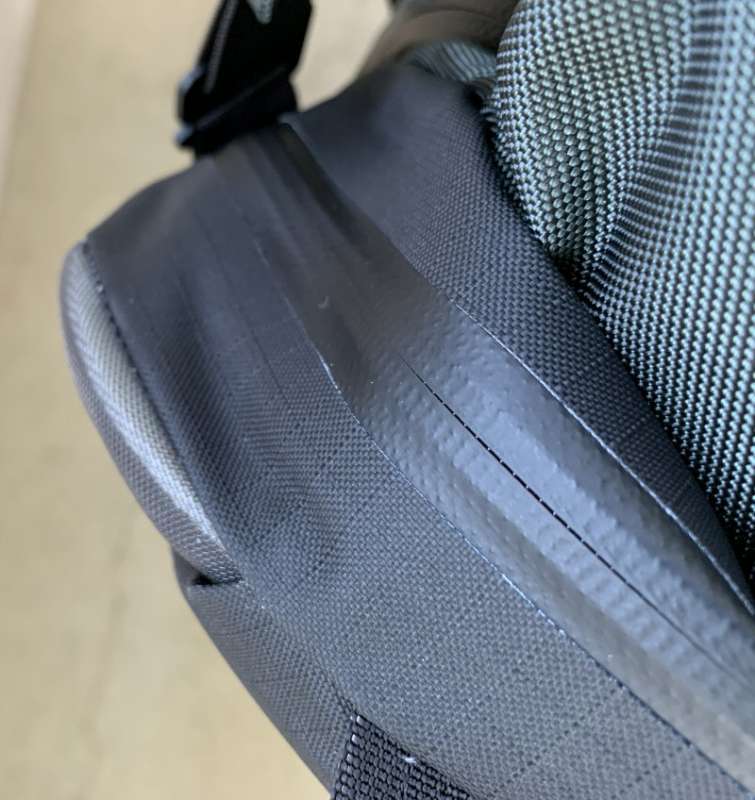
The image above shows the three layers of the Traveler: at the far left is the semi-rigid back panel that is attached to the outside of the Crash Pad’s, which is the black, TPU coated ripstop material in the middle, and on the far right is the grey-green canvas-like DWR coated Cordura EcoMade material, which a recycled material developed in partnership between Lander and Cordura specifically for the Lander Carry System of packs and bags.
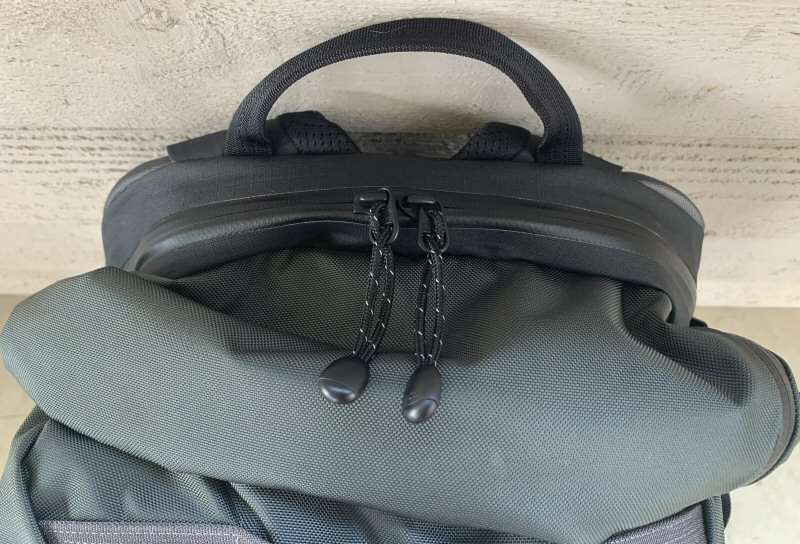 The opening of the Crash Pad has a water-resistant double-zipper at the very top of the pack.
The opening of the Crash Pad has a water-resistant double-zipper at the very top of the pack.
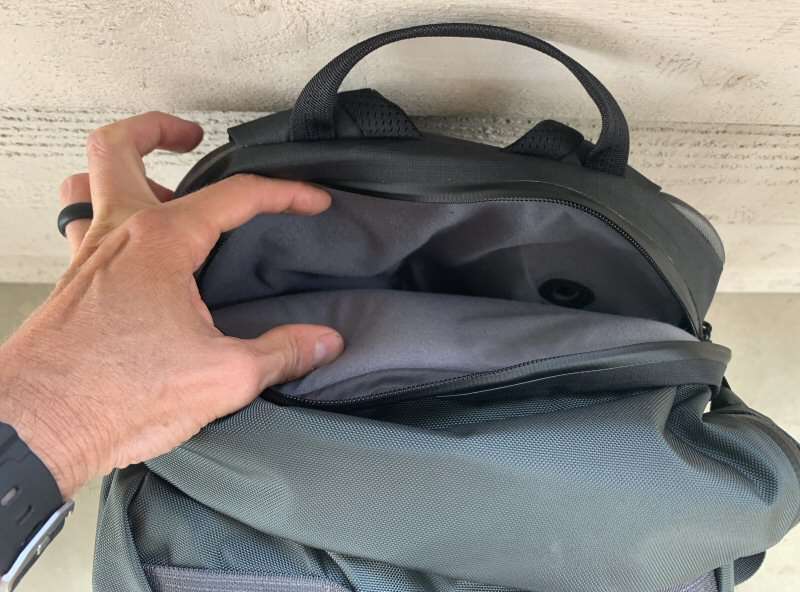
The Crash Pad is lined with the same light grey microfiber fleece fabric as the two exterior pockets describe above, and it also spans the width of the pack. The Crash Pad can hold up to a 17″ laptop, a capacity that is growing more and more uncommon in pack designs these days. Also, because the Crash Pad sleeve basically extends the entire length of the back of the Traveler, you could probably fit one or more additional items in it, even with a laptop—maybe a small cable pouch, notebook, or other small and/or flat items.
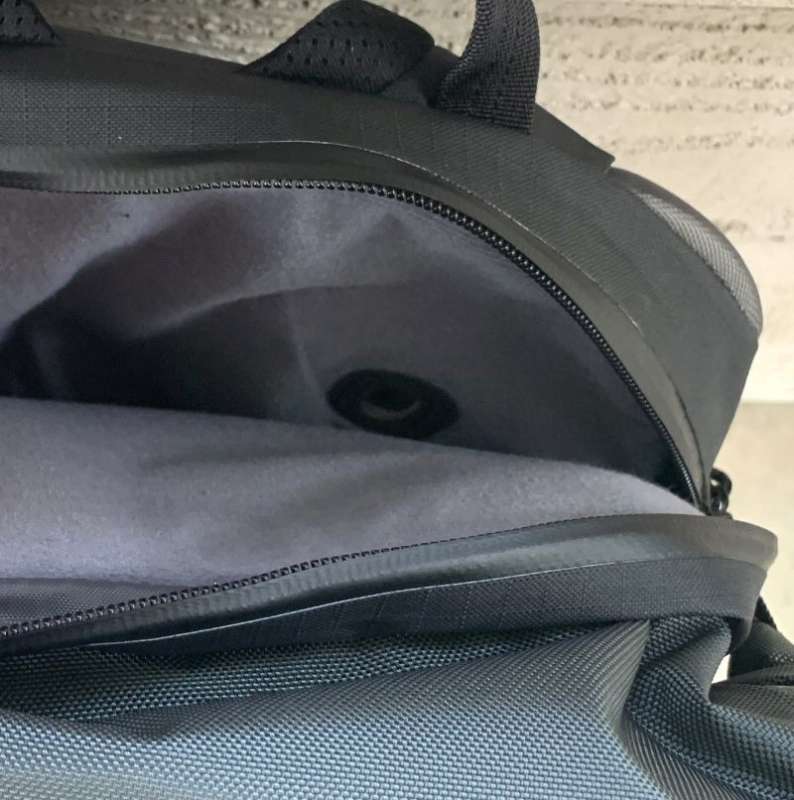
In the top right corner of the Crash Pad is the Hot Route portal leading into the right back pocket of the Traveler.
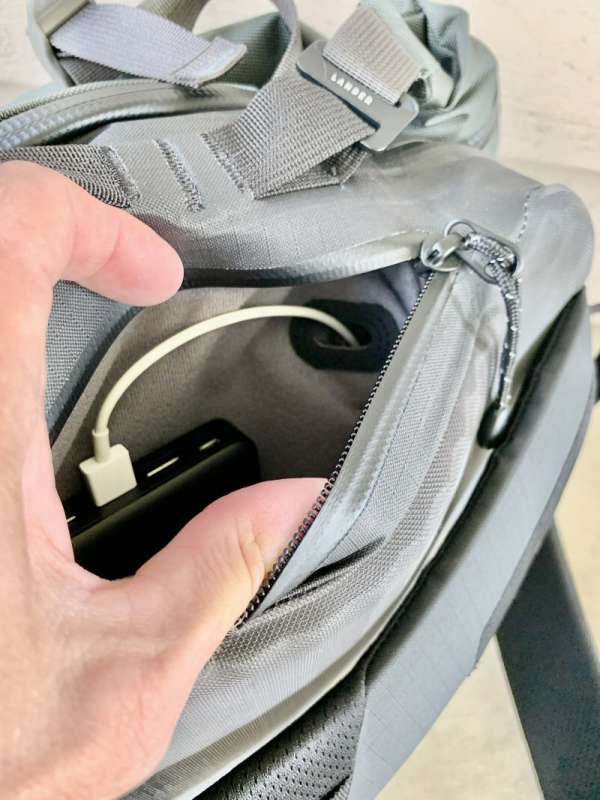 Hot Route essentially allows you to charge a mobile device while inside the Traveler. Above, I’ve placed a portable charger in the back Hot Route pocket and run a charging cable into the portal.
Hot Route essentially allows you to charge a mobile device while inside the Traveler. Above, I’ve placed a portable charger in the back Hot Route pocket and run a charging cable into the portal.
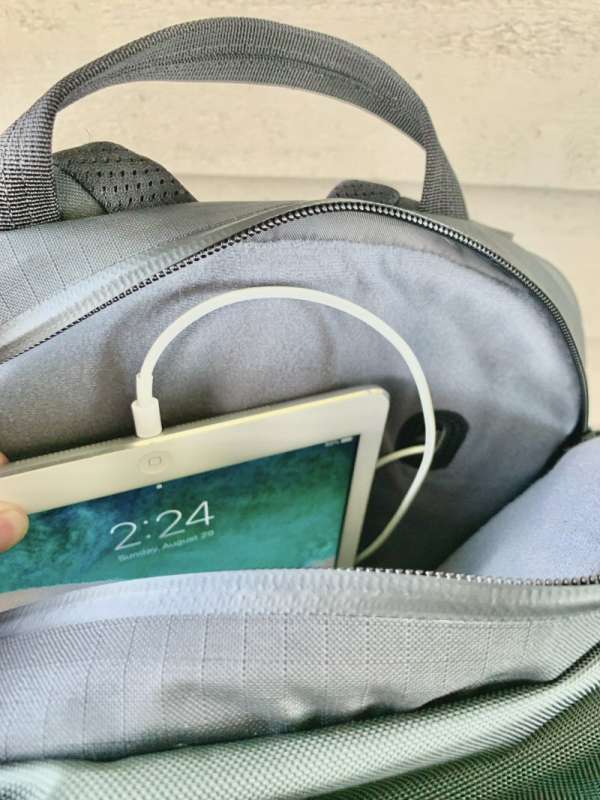
I then placed my iPad in the Crash Pad sleeve, then plugged the cable from the portable charger into it, allowing the iPad to charge while inside the pack. It’s a clever idea with subtle integration into the Traveler’s design.
Rolltop main compartment
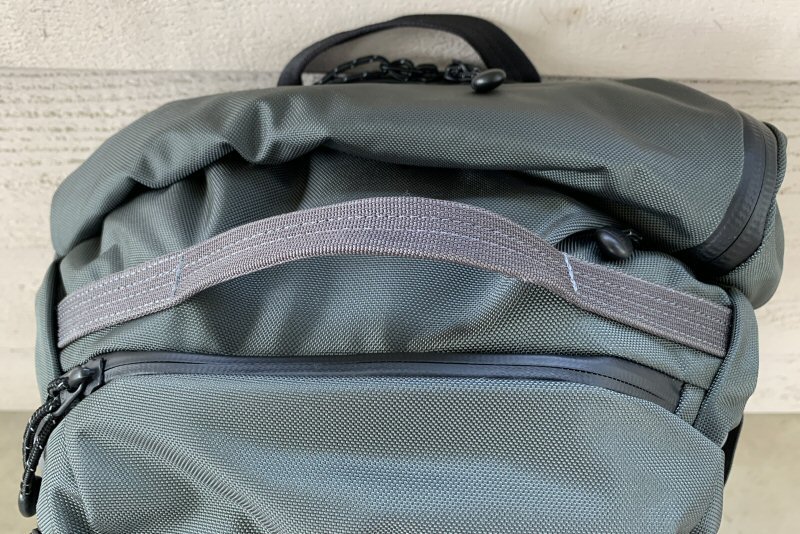
The Traveler is a roll-top design, meaning its main cargo section has a top opening that extends outward and can then be rolled down and secured.
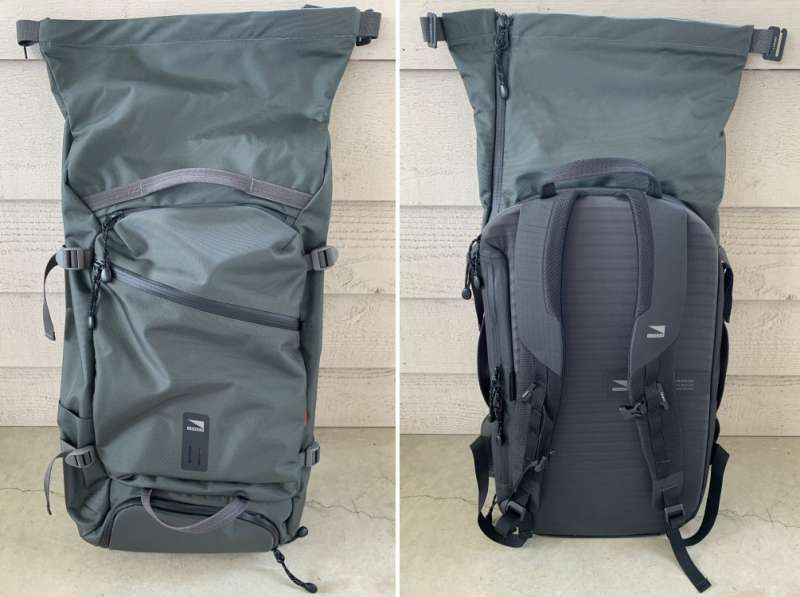
The photos above illustrate the Traveler’s roll-top feature in its fully unrolled and extended position.
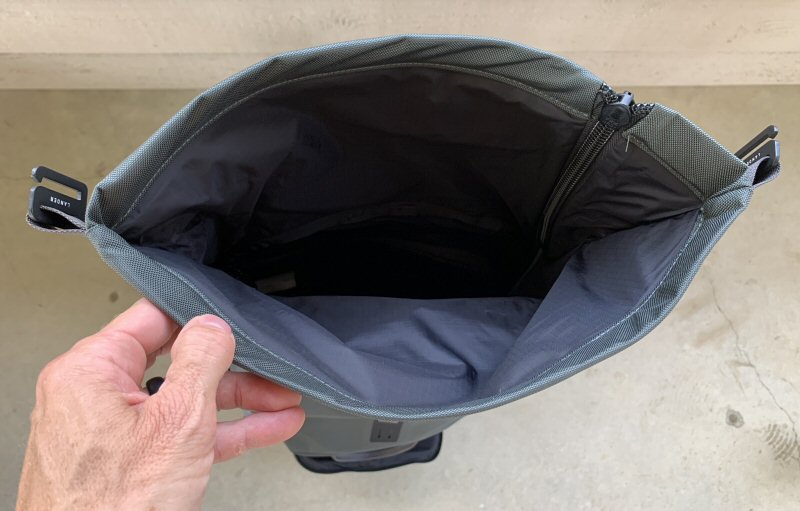
The above photo is looking down into the Traveler’s main cargo section compartment.
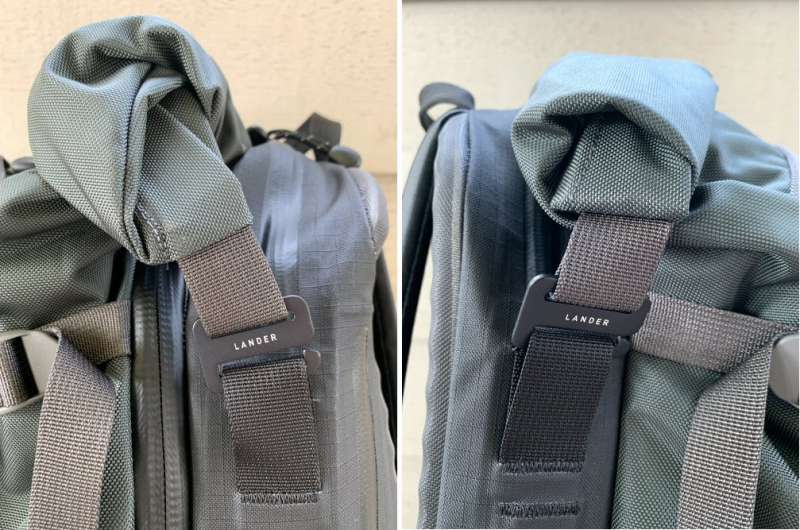
Once rolled down, the roll can be secured using a metal hook with a small Lander logo on each side Traveler.
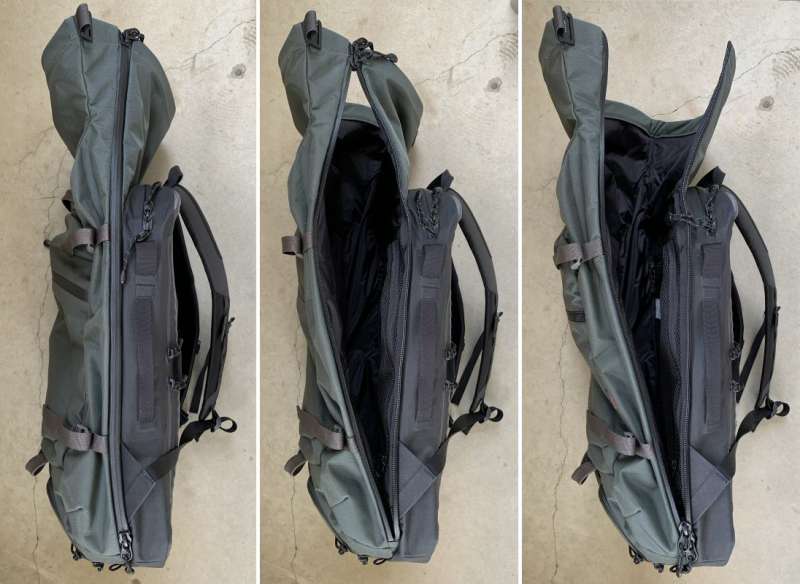
The other method of access to the Traveler’s cargo section is a long, side zipper that runs along the side of the pack starting from the bottom and to the end of the roll-top.
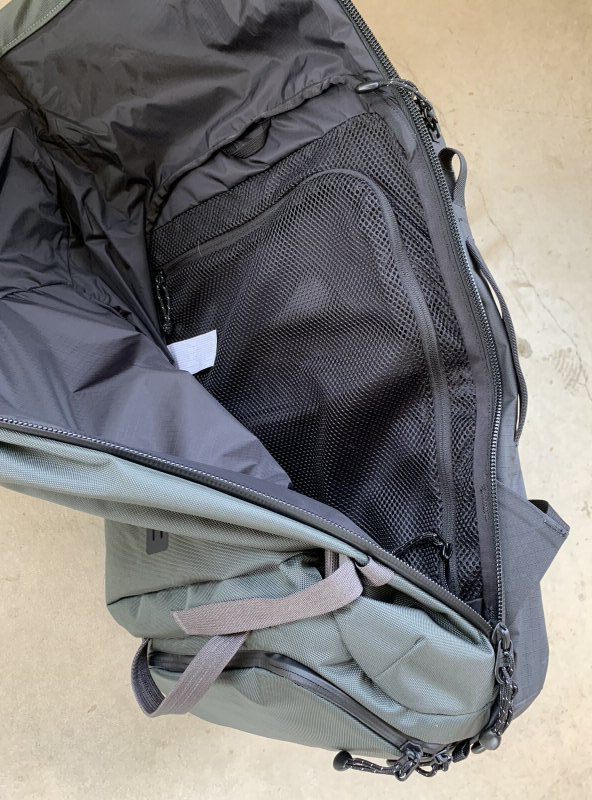
A single mesh zipper pocket runs along the back of the cargo space main compartment.
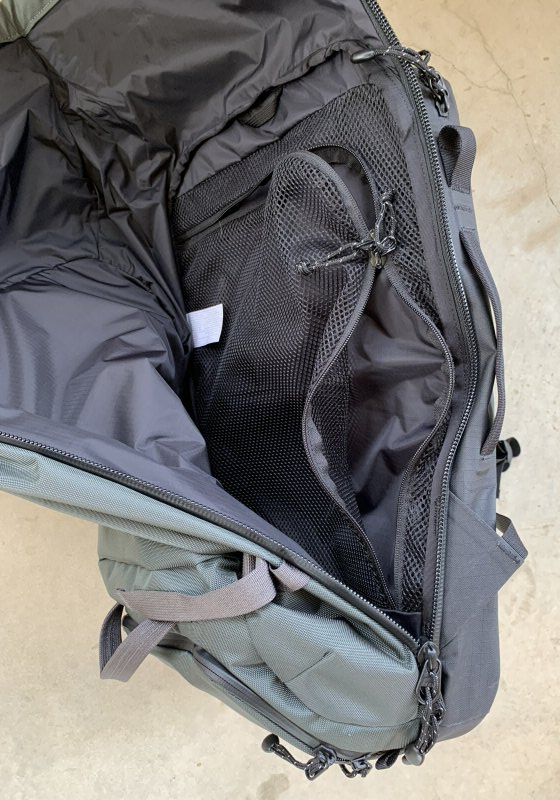
This mech pocket has two zippers for easier accessibility of its contents.
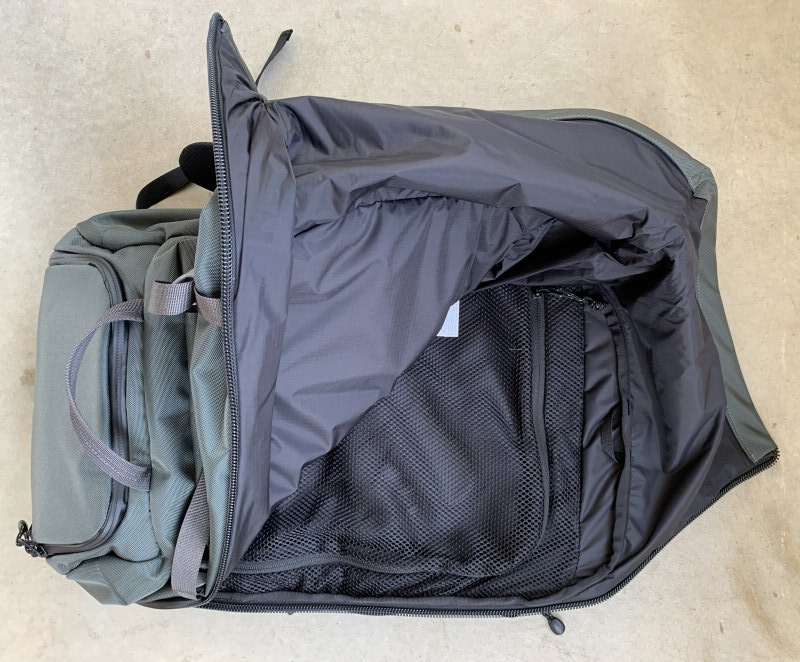
The cargo space is fairly cavernous with only the mesh pocket. While having a bunch of pockets, dividers, and other organization features here might be useful for a daily commuter tech pack, for a travel tech bag, it make more sense to omit these features and let the user decide how to best utilize this space. Want to fill it with clothing? Grab some compression sacks or travel cubes and load the cargo space up Tetris-style. Prefer to just jam things in here and yank them back out at your whim? Have at it? Plan to carry a bunch of sensitive and delicate gear—like a DSLR and accessories for example—get yourself a protective foam cube with dividers and fit it in here. Flexibility is the name of the game here.
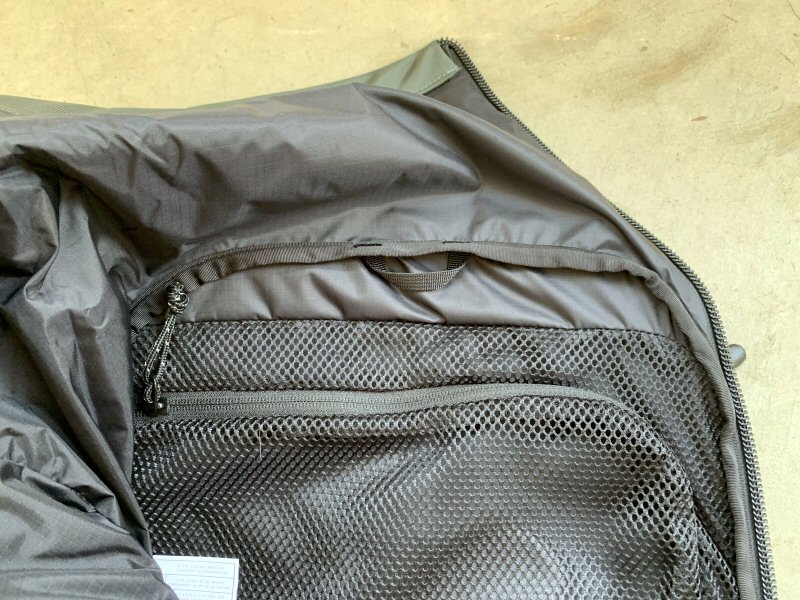
The only other feature inside the cargo space is a single webbing look at the top, which can be used to attach a carabiner to tether items and keep them from sliding around inside the cargo space.
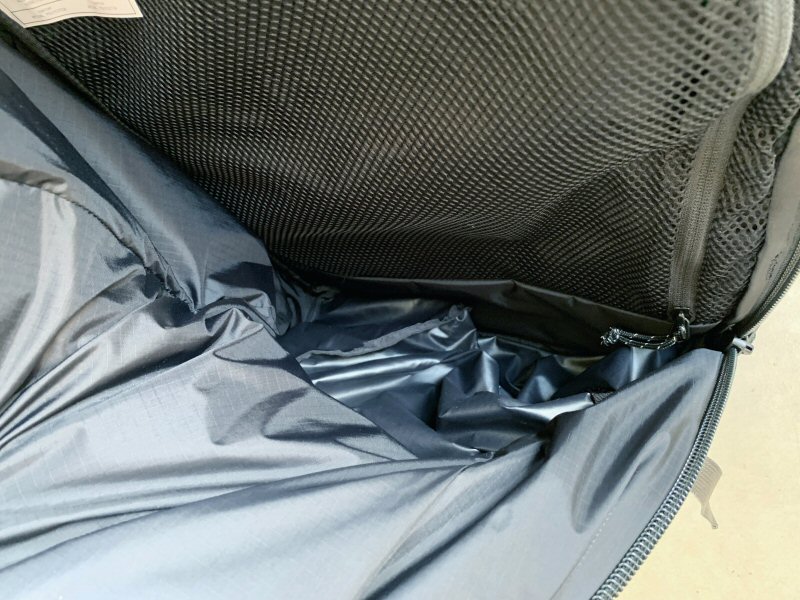
In the photo above, I’ve tried to show the extra fabric of the shoe compartment described above. When the shoe compartment is not fully filled, this extra material tucks down inside the bottom of the cargo space, but when the shoe compartment is filled or partially filled, this material expands and takes up some of the volume of the inside of the cargo space. This again illustrates the tradeoff between the shoe compartment and the cargo space—the more you utilize the space in one, the more it decreases the available space in the other.
Fit & fell
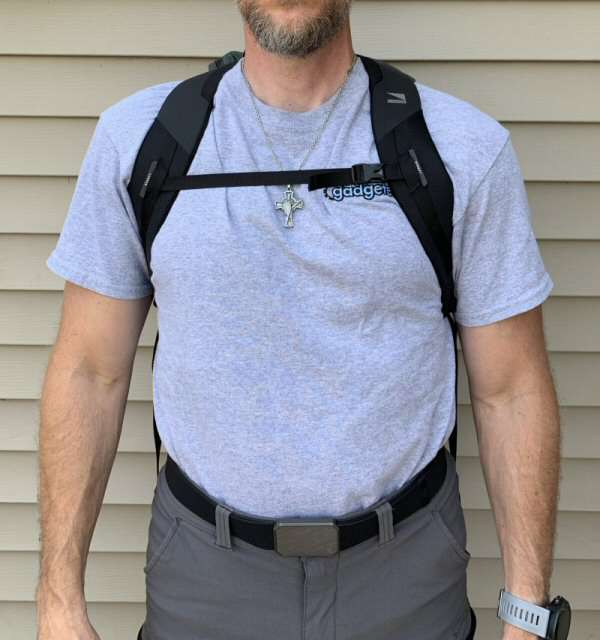
The Traveler’s shoulder harness system is easily adjustable and fits me comfortably due to to the shoulder straps’ slight ergonomic curvature and the sternum strap, which I only used if the Traveler was heavily loaded or if I needed more stability of the pack.
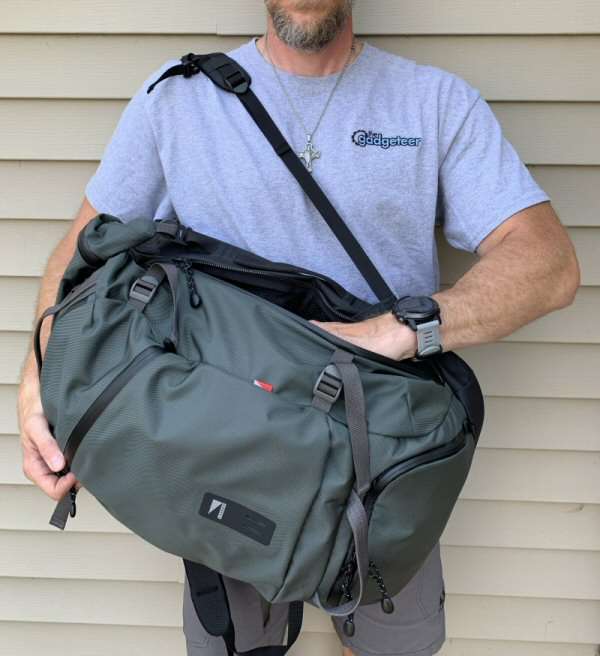
One of the hand features of the Traveler’s rolltop side zipper is that it allows you to loosen and remove the left shoulder strap, sling the pack around your right side to your front, then unzip the side zipper to access the main cargo space or either of the two back panel pockets. You can then easily sling the Traveler back onto your left shoulder, re-tighten the shoulder strap, and you are ready to roll.
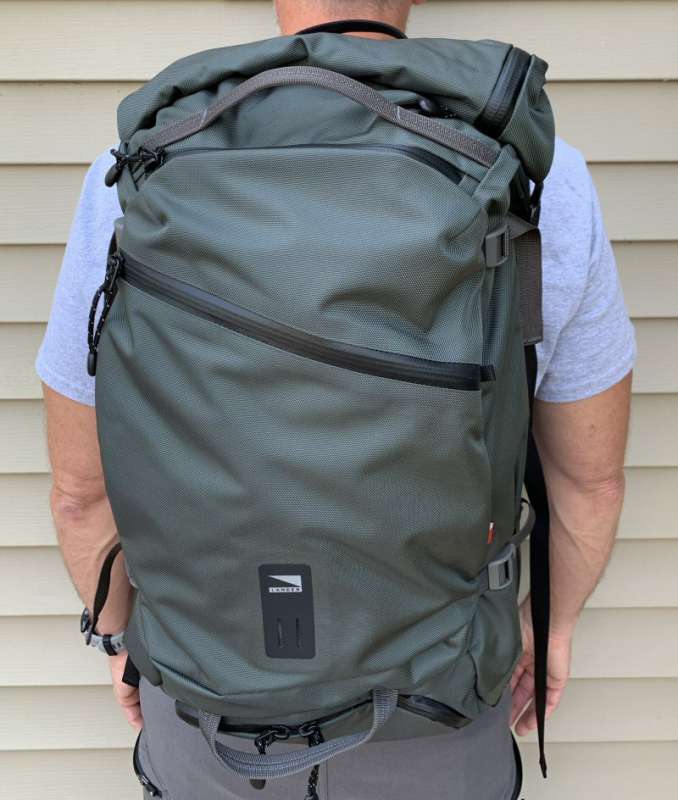
The Traveler is the largest pack in the Lander Carry System, and as can be seen in these images, it is a fairly large pack. However, keep in mind that it is intended more for travel, hiking, and other similar adventures, owing to its 35L capacity, which would be a bit large as a daily commute pack for most folks. However, as a travel bag for 3-4 day trips (or even longer, depending on the left of packing minimalist you practice), it’s a great size for One Bag Travel. For travel of that duration, it can easily take the place of a rolling carry-on bag which, let’s face it, are a pain to lug around.
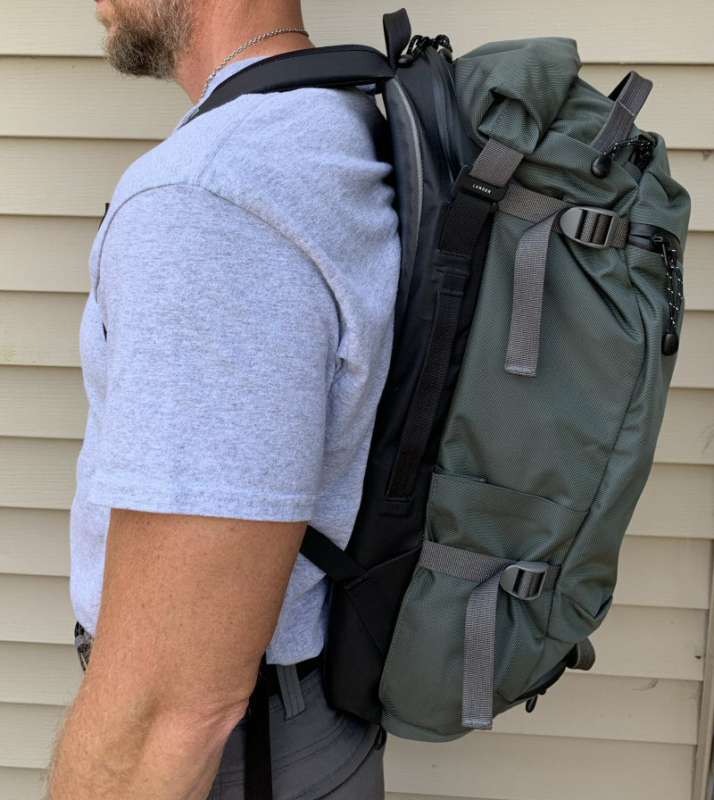
Not only is the Traveler’s shoulder harness system comfortable, but the pack itself is also quite comfortable, owing to its ability to conform to the shape of your spine. As seen in the image above, the Travel’s semi-rigid foam back panel flexes and bends in just the right spots to almost hug, which results in a much more comfortable fit than a pack with a fully rigid back panel. The last thing I’ll mention here is that many travel packs, especially ones in this capacity range, have a hip belt that can be used to help distribute the between the shoulders and the hip/waist area. While I don’t personally feel this is needed, some folks might, and one suggestion I’d make if the Lander folks are contemplating a Traveler 2.0 is the addition of an optional hip belt that can be easily detached and/or stowed inside the pack.
What I like
- Subtle gray-green with black and dark grey colorway
- Looks and feels solidly constructed
- High-quality materials for durability and resistance to the elements
- Cargo space has a large capacity
- Hot Route internal wireway feature is useful for charging while on the go
What I’d change
- Give the key leash in the front pocket a bit longer cord
- Add the option for a hip belt that can be easily detached and/or stowed away
Final thoughts
So did the Lander Traveler Backpack 35L live up to my own hype for it? Oh yes. And then some. This travel pack is well-designed and solidly constructed from high-quality materials and manufacturing techniques. It has just enough of the right features to be useful without cutting up the pack. It’s a perfect size and capacity for 3-4 day One Bag Travel adventures (even more if you are a minimalist packer). And maybe my favorite feature is its subdued grey-green/black colorway with gray accents—I can’t like this color more for a pack of this type. All in all, I found the Lander Traveler Backpack 35L to be a great pack, and I’d consider it an excellent value for its $175 price tag.
Price: $175
Where to buy: Lander.com and you can also find some of their bags on Amazon
Source: The sample of this product was provided byLander.com.



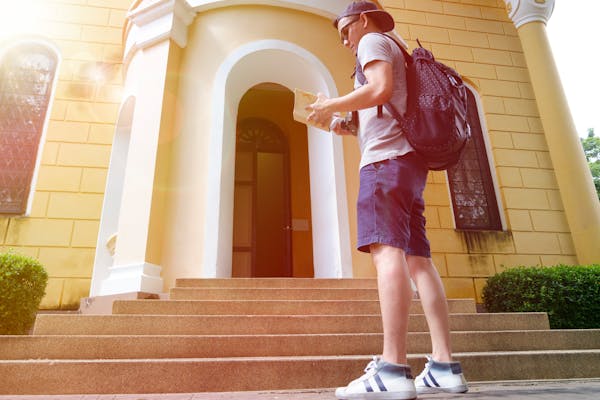
More Stories
Enjoy Heavenly Trip With Luxurious Tour Packages
Advantages and Disadvantages of External Frame Backpacks
A Bahamas Trip – Is It For You?